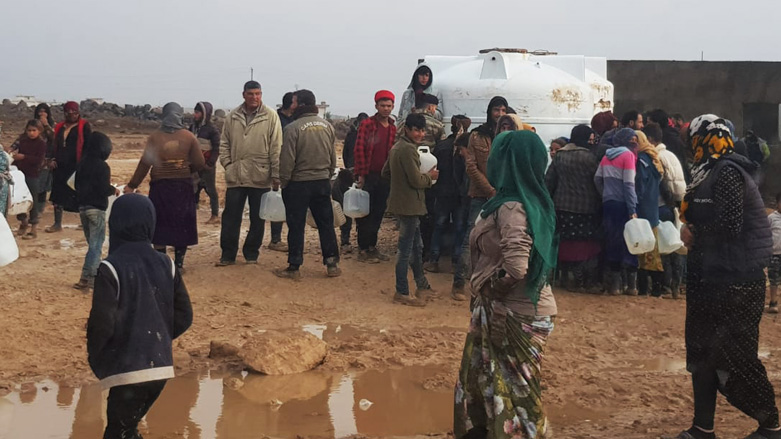Germany: Turkish-backed groups blocking water to Syria endangers civilians
Germany’s Ministry of Foreign Affairs has officially confirmed its stance that the decision by Turkish-backed militias to repeatedly cut off the water to the Kurdish-controlled Syrian northeast could have “severe humanitarian consequences” for the local civilian population.

ERBIL (Kurdistan 24) – Germany’s Ministry of Foreign Affairs has officially confirmed its stance that the decision by Turkish-backed militias to repeatedly cut off the water to the Kurdish-controlled Syrian northeast (Rojava) could have “severe humanitarian consequences” for the local civilian population.
“Access to clean water is a human right,” German lawmaker Helin Evrim Sommer told Kurdistan 24 on Tuesday.
“Turkey is once again violating international humanitarian law. The NATO-Council must finally deal with the war policy of its alliance partner Turkey and condemn Erdogan’s warfare against the civilian population in Rojava.”
Sommer, the Development Policy spokesperson for the Left Party bloc and member of the Bundestag's Defense Committee, previously sent a parliamentary inquiry to the foreign ministry that requested the government clarify its official view on the matter.

In a written reply on Thursday, Antje Leendertse, the State Secretary of the Federal Foreign Office, reported that according to information supplied to the office by humanitarian organizations, the water supply to Hasakah province has indeed recently been cut off to between 700,000 to 1.2 million people multiple times, “especially in the last few weeks.”
However, she avoided directly blaming Turkey or Turkish-backed groups, focusing instead on the effects of the actions such as the fact that they had forced the local population to rely on the limited availability of water that could be brought by truck.
“In view of the current increased water requirements to ensure adequate hygiene for infection prevention, a reduced water supply could have serious humanitarian consequences,” Secretary Leendertse said, adding that humanitarian actors have needed to step in to deliver “around 3.8 million liters of water every day.”
Therefore, she said, Germany supports humanitarian measures taken by cross-border non-governmental organizations in the northeast of Syria with a focus on healthcare, nutrition and hygiene.
Additionally, she continued, Germany is further assisting by with its financial support of relevant programs of the United Nations High Commissioner for Refugees (UNHCR), the World Food Program (WFP), and the International Committee of the Red Cross (ICRC) in all of Syria.

Turkish-backed militias have regularly cut off water from the Alouk water station to Hasakah province since October, demanding that Kurdish-led authorities in northeast Syria provide more electricity to areas under their control. The station is located near the border town of Ras al-Ain (Serekaniye), which Turkey and its militant proxies took control of during Turkey’s so-called Peace Spring Operation, also in October.
The last time the water was cut was on April 3, when shelling by Turkish-backed armed groups caused severe damage to a water pipeline.
On 4 April, the water flow was restored after local engineers repaired the pipeline.
Sommer, the German lawmaker, told Kurdistan 24 that Turkish President Recep Tayyip Erdogan has been weaponizing water against the people of northeast Syria, by “ordering his jihadist mercenaries to fire on the Al-Alouk water pumping station.”
Her sentiment echoed those of groups like Human Rights Watch (HRW), which warned in late March that “Turkish authorities’ failure to ensure adequate water supplies to Kurdish-held areas in Northeast Syria is compromising humanitarian agencies’ ability to prepare and protect vulnerable communities in the COVID-19 pandemic.”
Read More: Turkish-backed groups in Syria ‘weaponizing water in global pandemic’: HRW
UNICEF and both local and international human rights organizations have roundly criticized the interruption of essential water supply to civilians in Hasakah, fearing it could affect thousands of civilians that need clean water during the coronavirus pandemic.
The Alouk water station is the main source of water for over half a million people in Hasakah, Tal Tamir, and also the al-Hol and Areesha displacement camps which host tens of thousands of displaced civilians and also local and foreign families with alleged ties to the Islamic State.
Editing by John J. Catherine